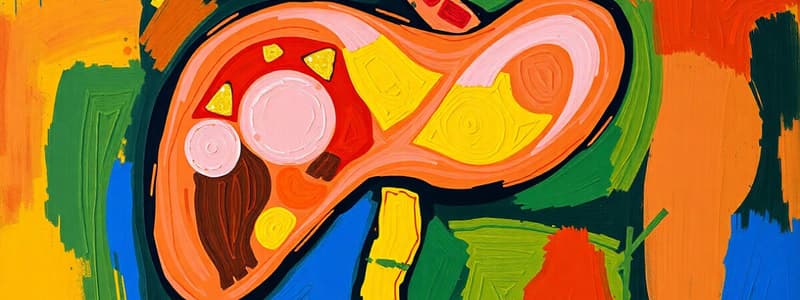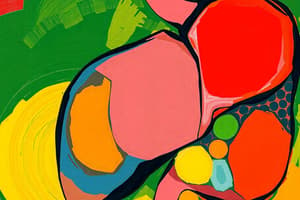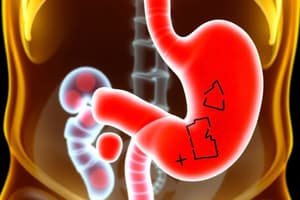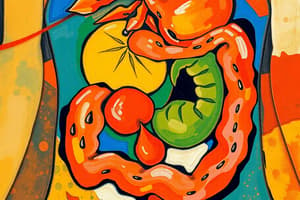Podcast
Questions and Answers
What is a common clinical manifestation of cholecystitis?
What is a common clinical manifestation of cholecystitis?
- Persistent headache
- Severe pain radiating to the left shoulder
- Steady ache in the left upper quadrant
- Progressively worsening RUQ or epigastric pain (correct)
Which combination of therapies is appropriate for managing biliary colic?
Which combination of therapies is appropriate for managing biliary colic?
- Surgery and IV antibiotic therapy
- Laparoscopic surgery and clay-colored stool monitoring
- Oral dissolution therapy and antihistamines
- Analgesics and antiemetics (correct)
Which symptom is most indicative of cholangitis?
Which symptom is most indicative of cholangitis?
- Clay-colored stools (correct)
- Fat intolerance
- Acute onset of nausea
- Severe RUQ tenderness only
In choledocholithiasis, what is a likely symptom?
In choledocholithiasis, what is a likely symptom?
What is a possible non-surgical treatment option for chronic cholecystitis if surgery is contraindicated?
What is a possible non-surgical treatment option for chronic cholecystitis if surgery is contraindicated?
What characterizes the pain associated with cholelithiasis?
What characterizes the pain associated with cholelithiasis?
Which symptom is more commonly associated with cholecystitis than with cholelithiasis?
Which symptom is more commonly associated with cholecystitis than with cholelithiasis?
What is a complication of cholelithiasis?
What is a complication of cholelithiasis?
How does the pain from cholecystitis differ from that of cholelithiasis?
How does the pain from cholecystitis differ from that of cholelithiasis?
Which of the following is NOT an associated symptom of cholecystitis?
Which of the following is NOT an associated symptom of cholecystitis?
What can happen if there is common bile duct obstruction associated with cholelithiasis?
What can happen if there is common bile duct obstruction associated with cholelithiasis?
What is a notable difference in the duration of pain between cholecystitis and cholelithiasis?
What is a notable difference in the duration of pain between cholecystitis and cholelithiasis?
Which complication is specific to chronic cholecystitis?
Which complication is specific to chronic cholecystitis?
What is the primary treatment for patients with symptomatic gallstones or acute cholecystitis?
What is the primary treatment for patients with symptomatic gallstones or acute cholecystitis?
Ultrasonography of the gallbladder is less accurate than a CT scan for diagnosing cholelithiasis.
Ultrasonography of the gallbladder is less accurate than a CT scan for diagnosing cholelithiasis.
Which diagnostic test can indicate obstructed bile flow by measuring direct bilirubin levels?
Which diagnostic test can indicate obstructed bile flow by measuring direct bilirubin levels?
The ________ scan uses an IV radioactive solution to diagnose cystic duct obstruction.
The ________ scan uses an IV radioactive solution to diagnose cystic duct obstruction.
Match the following diagnostic tests with their descriptions:
Match the following diagnostic tests with their descriptions:
Flashcards are hidden until you start studying
Study Notes
Cholelithiasis
- Characterized by the presence of gallstones in the gallbladder.
- Gallstones are hardened deposits of cholesterol, bile pigments, and calcium salts.
- Symptoms:
- Abrupt onset of severe, steady pain localized to the epigastrium and right upper quadrant (RUQ) of the abdomen.
- Radiates to the back, right scapula, and shoulder.
- Pain lasts for 30 minutes to 5 hours.
- Aggravated by movement and breathing.
- Associated symptoms: nausea, vomiting.
- Complications:
- Can lead to cholecystitis, common bile duct obstruction, pancreatitis, gangrene, perforation, peritonitis.
- May result in chronic cholecystitis, empyema, fistula formation, and gallstone ileus.
Cholecystitis
- Inflammation of the gallbladder.
- Caused by gallstones blocking the cystic duct.
- Symptoms:
- Abrupt onset of severe, steady pain in the right upper quadrant (RUQ) of the abdomen.
- Pain lasts for 12 to 18 hours and is generalized in the RUQ.
- Radiates to the back, right scapula, and shoulder.
- Associated symptoms: anorexia, nausea, vomiting, RUQ tenderness and guarding, chills and fever.
Biliary Colic
- Caused by the passage of a gallstone through the cystic duct or common bile duct.
- Symptoms:
- Severe, steady ache in the RUQ that begins suddenly and lasts for several hours.
- May radiate to the right scapula or back.
- Nausea and vomiting are common.
- Fat intolerance.
- Treatment:
- Analgesics for pain relief.
- Adequate rest and nutrition.
- Correction of electrolyte imbalances.
- Antiemetics for nausea.
- Surgery to remove the gallbladder (cholecystectomy) is the definitive treatment.
Choledocholithiasis
- Presence of gallstones in the common bile duct.
- Symptoms:
- RUQ pain.
- Fever.
- Jaundice (yellowing of the skin and eyes).
- Pruritus (itching).
- Abdominal tenderness.
- Treatment:
- Analgesics for pain relief.
- Antihistamines for itching.
- Adequate nutrition.
- Antibiotics for infection.
- Antiemetics for nausea.
- Surgery to remove the gallstones.
Cholangitis
- Infection of the bile ducts.
- Usually occurs in the presence of choledocholithiasis.
- Symptoms:
- RUQ pain.
- Fever.
- Jaundice.
- Pruritus.
- Abdominal tenderness.
- Clay-colored stools.
- Dark urine.
- Low blood pressure.
- Lethargy.
- Treatment:
- Aggressive intravenous antibiotics.
- Antiemetics for nausea.
- Surgery is often needed to remove the gallstones and drain the infected bile ducts.
Treatment of Cholelithiasis and Cholecystitis
- Treatment depends on the severity of the condition and the patient's health.
- Asymptomatic patients with low complication risk are treated conservatively.
- Surgical removal of the gallbladder is indicated for frequent symptoms, acute cholecystitis, or large stones.
Diagnostic Tests
- Tests identify stones, complications, and differentiate gallbladder disease from other disorders.
- Elevated direct bilirubin suggests obstructed bile flow.
- Elevated WBC count in CBC indicates infection and inflammation.
- Serum amylase and lipase levels help diagnose pancreatitis related to common duct obstruction.
- Abdominal x-ray can detect calcium-rich gallstones.
- Ultrasonography accurately diagnoses cholelithiasis and assesses gallbladder emptying.
- Oral cholecystogram assesses gallbladder's ability to concentrate and excrete bile.
- Cholescintigraphy (HIDA scan) uses an IV radioactive solution to diagnose cystic duct obstruction and acute or chronic cholecystitis.
Studying That Suits You
Use AI to generate personalized quizzes and flashcards to suit your learning preferences.




